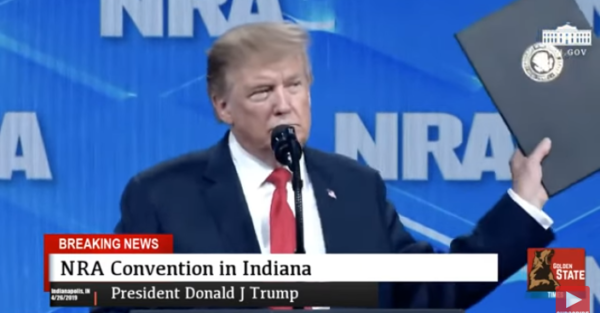
Does the establishment media understand the difference between “very meaningful background checks” on people purchasing firearms, and so-called “universal background checks” that ostensibly apply to all gun sales and transfers?
That’s a question reporters and pundits may be unable to answer, as the press appears locked into a crusade to portray President Donald Trump as having crawfished on a vow to pursue background checks in response to high-profile shootings in California, Texas and Ohio over the past month. The president told reporters he would consider “very meaningful background checks.”
Apparently that doesn’t mean—and never did—what reporters think it means.
USA Today reported, “Almost two weeks ago, before departing the White House, Trump had said ‘we need intelligent background checks’ and that Senate Majority Leader Mitch McConnell was ‘totally on board’ …Now, that option appears to have been shelved.”
The “universal background check,” according to skeptics, is a de facto national gun registration scheme because it would require a check every time a firearm changes hands, such as selling or even gifting a firearm to a neighbor or friend. This theoretically tracks the movement of a firearm between law-abiding citizens, since it is widely accepted—perhaps by everyone but hardcore gun control extremists—that criminals routinely ignore gun laws, including background check requirements. It does not appear that the president specifically used the term “universal” when referring to where he might be willing to go with background checks.
But the gun prohibition lobby and its media sympathizers want that system in place. It involves paperwork that must be retained by the dealer, and a check with the FBI’s National Instant Check System (NICS).
What the media only mentions in passing is the fact that nearly all mass shooters in recent history did pass background checks. Exceptions include two individuals who murdered parents to get their legally-purchased guns, and one individual who “borrowed” a gun without permission from his stepfather.
As the president reminded reporters over the weekend, “People don’t realize we have very strong background checks right now,” as noted by the New York Times.
The Atlantic is reporting, “The president had recently suggested he was open to the gun-control measure, tweeting, ‘Republicans and Democrats must come together and get strong background checks, perhaps marrying this legislation with desperately needed immigration reform.’”
Trump picks his words carefully when talking about guns, some observers have suggested. “Meaningful” and “strong” in reference to background checks do not translate to “universal,” regardless how the press may wish to interpret his comments.
In the midst of this controversy is something else that gun control proponents appear reluctant to discuss: mental health. Trump observed, and was quoted by the NY Times, that mental health is an issue lurking in the shadows. Last Sunday, the newspaper reported, the president reminded reporters, “I don’t want people to forget that this is a mental health problem. I don’t want them to forget that, because it is. It’s a mental health problem.”
It’s a component of the dilemma anti-gunners carefully avoid because it shifts the conversation away from guns. But this has been a policy disaster in the making for decades, some suggest, since the closing of mental institutions began back in the 1960s, as detailed by a history of the effort at The Balance. That report includes a section headlined “Deinstitutionalization and Mass Murders” that adds a perspective apparently unwelcome to the conversation, at least by the gun prohibition lobby.
Over the years, mental health treatment options have, according to the report, not been able to address needs. A possible result of this might be that people with serious mental problems have not been adequately treated, but since they have no criminal background nor have they been institutionalized, they would be able to clear background checks.
Anti-gunners address this by pushing so-called “red flag laws,” but the firearms community is wary of such laws because they are allegedly ripe for abuse, and they may not pass constitutional muster. Judge Andrew Napolitano recently made that argument at Fox News, as reported earlier.
This brings the dilemma back around to what Trump said about background checks. They need to be “meaningful.” That doesn’t necessarily mean “universal.”
“Meaningful” would translate to a check that accomplishes something, with a NICS system that has up-to-date information on people who are legally disqualified from owning or possessing firearms, including those with severe mental health problems that, 40 years ago might have meant institutionalization.
As originally intended, the “instant check” would be conducted swiftly, with minimal inconvenience, and a gun buyer would be able to finish his/her business and be on their way. Their rights would be secure.
One thing emerging from all of this reporting about gun control proposals is that the press, and Capitol Hill anti-gunners still apparently do not understand that they’re talking about a constitutionally-protected right that, according to the federal constitution, “shall not be infringed.” Some state constitutions require that the right “shall not be impaired.”
Yet, what else would someone call background checks, waiting periods, licensing and registration, mandatory “buyback” which is a sanitary way to discuss confiscation with compensation—you take money for your guns or get prosecuted—if these measures applied to the exercise of any other constitutional right?
Only guns are treated differently. Perhaps it is time for politicians and the press to explain why.
——————————————————-
RELATED:
Fox News’ Napolitano: ‘Red Flag’ Violates Due Process